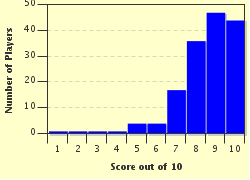Quiz Answer Key and Fun Facts
1. From the Arabic "al-qútun", we get the Spanish "algodón", the word for this substance that may have been new to the people of Iberia (Spain) during the Moorish rule of the peninsula in Medieval times.
2. From Moorish fishermen we get the word "al-bakura", which became the Spanish "albacore". This one should sound familiar to piscivores in the English-speaking world.
3. This word from the Arabic language, "bakari", was adopted by Iberians as "vacari", which defines a certain classification of livestock animals. Does it look familiar?
4. Arabic-speaking Moors would drink from a "taza", which the Iberian Spaniards would call "la tasa". What were they drinking from?
5. The Spanish word "rincón" is a borrow word from the Arabic "rukan". Can you name the English that is just around the bend?
6. The Arabic expression "Wa-'llah!" is best translated into Spanish as "Ole!". English speakers might exclaim what?
7. If a Spanish was called "lawqa" by an Arabic speaker, they may recognize they are being called "loco". What would this insult sound like in English?
8. A familiar Arabic word "al-fafaa" changes just slightly into the Spanish word "alfalfa". See if you can figure the English word out.
9. The Arabic preposition "hatta" was mutated into Spanish as "hasta". Often used by American English speakers, what does it mean?
10. This one will be reversed. I'll give you the Spanish word and you give me the Arabic word that was influenced by it.
The Spanish word for "shirt" is "camisa". What do you think that the Arabic word would be?
Source: Author
zombipi
This quiz was reviewed by FunTrivia editor
stedman before going online.
Any errors found in FunTrivia content are routinely corrected through our feedback system.

